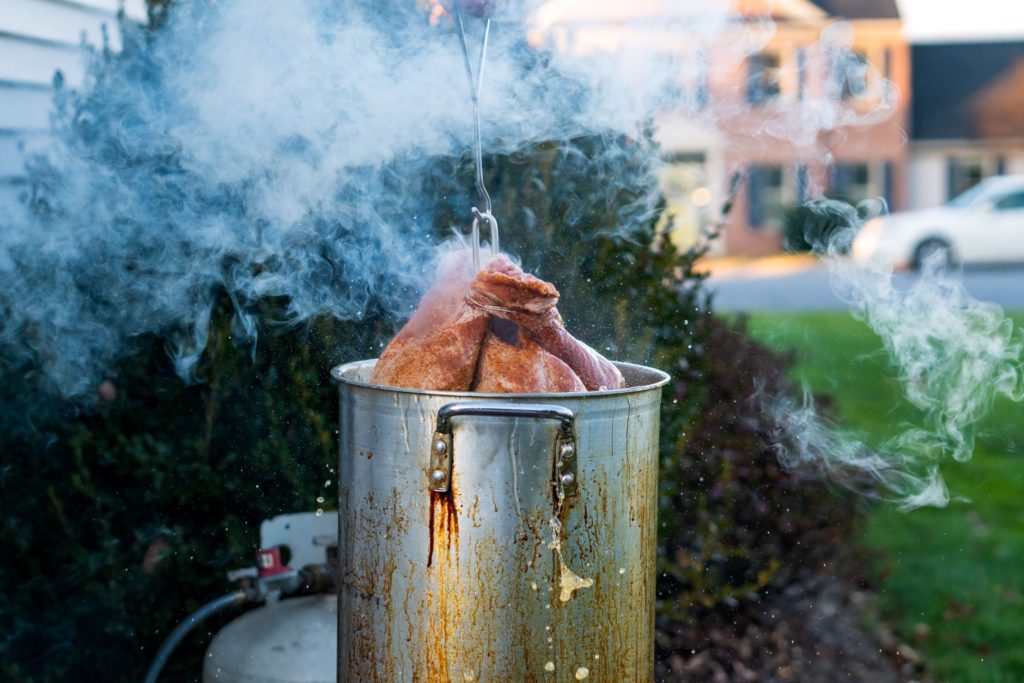
While we are home relaxing over the holidays, emergency personnel are busier than ever with calls relating to cooking fires and accidents. And turkey-frying mishaps are behind many of these calamities.
Turkey fryers are inherently treacherous; they are giant vats filled with hot oil that the bird has to be lowered into and lifted out of. Here are some of the risks:
If the turkey is even a little wet (or still partially frozen) when it goes in to cook, dangerous oil spattering can result.
- Many turkey fryers lack adequate thermostats, which means the oil can overheat and potentially cause a fire.
- Fryers can easily tip over, spilling gallons of hot cooking oil over a large area.
- Overfilling the fryer with oil may cause the hot oil to overflow when the turkey is inserted.
- If even a small amount of oil lands on the burner, a large fire can result.
- The sides and handles of the fryer can get dangerously hot, causing severe burns.
Safety tips
If you have your heart set on a deep-fried turkey this Thanksgiving, take these precautions (some courtesy of the National Park Service) to protect yourself, your family and your home.
- Always use the fryer outdoors on a flat surface, away from structures (at least 10 feet away from any buildings), wooden decks and covered patios. Never use the fryer in a garage or an enclosed space.
- Never operate a fryer in the rain or snow.
- Have an all-purpose fire extinguisher nearby and ready to use. Don’t use water or a garden hose on a turkey fryer fire.
- Ensure the turkey is completely thawed and dry to prevent a fire, spattering or splash-over.
- Don’t overfill the fryer. To ensure you’re using the right amount of oil, place the thawed turkey in the fry pot and add enough water to cover the bird by ½ inch. Remove the turkey and mark the water level. Dump out the water and thoroughly dry both the pot and the turkey. When you’re ready to cook, fill the pot with oil just to the marked level.
- Never leave the fryer unattended. Monitor the temperature of the oil with an accurate thermometer to prevent it from overheating and catching fire. If the oil begins to smoke, immediately turn the gas off.
- Lower and raise the turkey slowly to prevent oil splatter, burns and fire.
- Ensure the turkey harness is strong and secure; you don’t want it breaking (and potentially causing a big splash of oil) as you’re putting the turkey in or lifting it out.
- Keep children and pets away from the fryer both during and after cooking. The oil stays very hot for a long time after you turn the burner off.
- Use thick potholders or oven mitts, and wear long sleeves and safety goggles.
- Even if you live in a warm climate, wear closed-toe shoes while you’re frying the turkey to protect your feet from possible splashes and spatters.
- Stand upwind of the fryer so heat blows away from you.
- Let the oil cool down overnight before disposing of it. Seal it into a disposable container and throw it away in the trash. If you’re worried the container will leak, leave it in the freezer until the oil congeals into a solid, then throw it away.
No matter how you decide to cook your holiday turkey, it’s a good idea to contact your insurance professional to make sure you have the right homeowners insurance to protect your home and belongings in the event of an accident. Don’t let a turkey mishap ruin your holiday plans.
